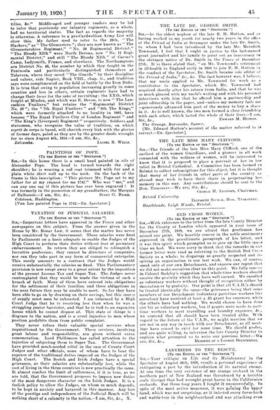TAXATION OF jUDICIAL SALARIES. (To THE EDITOR OF THE "SPECTATOR."]
Ste,—Important letters have appeared in the Times and other newspapers on this subject. From the answer given in the House by Mr. Boner Law, it seems that the matter has never
been considered by the Government. These salaries were fixed by Parliament on .a basis adequate to enable the Judges of the High Court to perform their duties without fear of pecuniary embarrassment. In return they are obliged to relinquish a lucrative profession; they cannot be directors of companies, nor can they take part in any form of commercial enterprise. This surely amounts to a contract that the Judges would receive substantially the salaries so fixed. This Parliamentary provision is now swept away to a great extent by the imposition of the present Income Tax and Super Tax. The Judges never contemplated that they would be made the victims of such a breach of faith. Many of them have entered into obligations for the settlement of their families, and these obligations in the near future they may be unable to meet. So far they have been able to go on by drawing on their savings, but this soupse of supply must soon be exhausted: I am informed by a High Court Judge that he is receiving less than when he was a struggling junior barrister, and that he is tied to an expensive house which he cannot dispose of. This state of things is a disgrace to the nation, and is a cruel injustice to men whose pesition_prohibits them from public complaint.
. They never refuse their valuable special services when requisitioned by the Government. These services, involving great labour and responsibility, ,are given without extra remuneration. Lord Phillimore has called attention to the injustice of subjecting them to Super Tax. The Government have provided much-needed relief in the case of County Court Judges and other officials, none of 'whom have to bear the expense of the traditional duties imposed on the Judges of the High Court. The Scotch and Irish Judges have a special grievance, as their salaries are substantially less, while the cost of living in the three countries is now practically the same. It almost reaches the limit of callousness, if it is true, as we are told, that the Government proposes to impose new duties of the most dangerous character on the Irish Judges. It is a foolish policy to allow the Judges, on whom so much depends, to lie kept in anxiety and harassed in this manner. Any loss of the prestige and independence of the Judicial Bench will be nothing short of a calamity to the nation.—I am, Sir, &c., X.


































 Previous page
Previous page